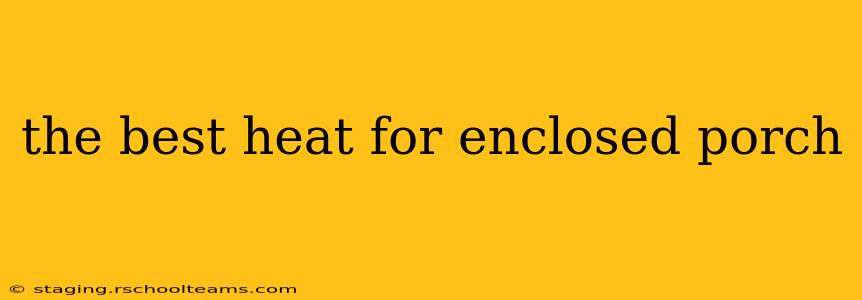Enclosed porches offer a fantastic extension of your living space, bridging the gap between indoors and outdoors. However, enjoying this extra room year-round requires finding the right heating solution. This guide explores various heating options for enclosed porches, helping you choose the best system to keep you warm and cozy, regardless of the weather outside.
Understanding Your Porch's Heating Needs
Before diving into specific heating systems, consider these crucial factors influencing your porch's heating requirements:
-
Porch Size and Insulation: A larger, poorly insulated porch will require a more powerful heating system than a smaller, well-insulated one. Assess your porch's dimensions and insulation levels to determine the BTU (British Thermal Unit) output needed. Better insulation translates directly to lower heating costs.
-
Climate: Your geographical location significantly impacts heating needs. Colder climates demand higher BTU outputs and potentially more robust heating solutions.
-
Usage: How frequently will you use the enclosed porch? Occasional use might justify a less powerful, budget-friendly option, whereas daily use warrants a more efficient and powerful system.
-
Budget: Heating systems range significantly in price. Determine your budget beforehand to narrow down the most suitable choices.
Best Heating Options for Enclosed Porches
Several heating options cater specifically to the unique needs of enclosed porches:
1. Electric Space Heaters
- Pros: Affordable, easy to install, portable, and quick heating. Perfect for smaller porches or supplemental heating.
- Cons: Can be expensive to run, potentially unsafe if not used correctly, and may not be sufficient for large or poorly insulated spaces. Consider models with safety features like tip-over shutoff.
2. Radiant Heaters
- Pros: Efficient, comfortable warmth, and relatively easy installation (depending on the type – electric or gas).
- Cons: Can be expensive upfront, installation complexity varies depending on type, and may not be suitable for all porch designs.
3. Electric Baseboard Heaters
- Pros: Discreet, even heating, and relatively easy installation.
- Cons: Can be expensive to run, less portable than space heaters, and may not be as aesthetically pleasing as other options.
4. Gas Heaters (Propane or Natural Gas)
- Pros: Powerful heating, cost-effective in the long run (especially with natural gas), and ideal for larger spaces.
- Cons: Require professional installation, potential safety hazards if not properly installed and maintained, and may not be suitable for all locations (due to gas line availability). Ensure proper ventilation.
5. Mini-Split Heat Pumps
- Pros: Highly energy-efficient, versatile (heating and cooling), and relatively quiet operation.
- Cons: Higher upfront cost than other options, require professional installation, and may not be the best choice for very small porches.
Choosing the Right System for You
The "best" heating system depends entirely on your individual needs and circumstances. Consider the following checklist:
- Size and insulation of your porch: Larger, poorly insulated porches necessitate more powerful heating.
- Your budget: Heating systems range significantly in price.
- Your climate: Colder climates demand more robust heating solutions.
- Your desired level of comfort: Some systems provide more even heating than others.
- Ease of installation and maintenance: Consider your DIY skills and maintenance preferences.
By carefully weighing these factors, you can select the ideal heating system to transform your enclosed porch into a comfortable and enjoyable space throughout the year. Remember to consult with a qualified HVAC professional for personalized advice and installation, particularly for gas heaters and mini-split systems.
